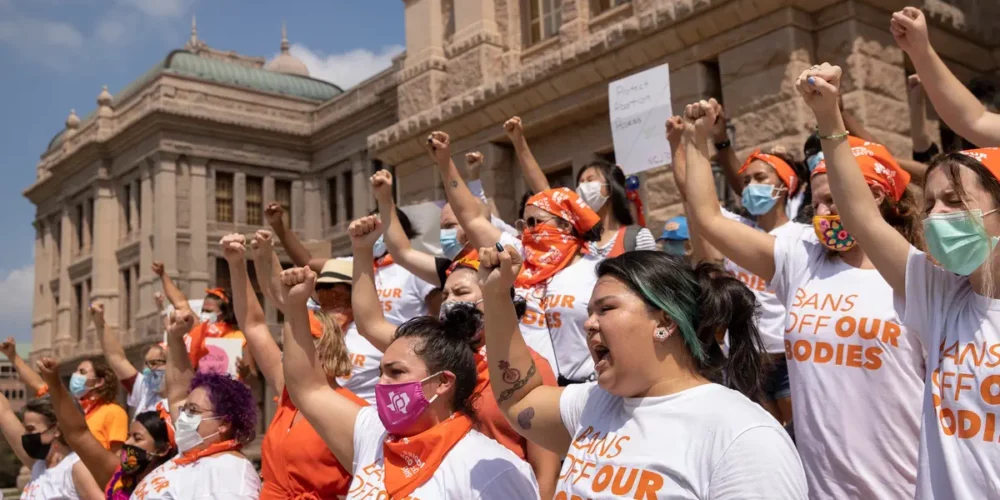On Wednesday 1 September 2021 the most restrictive abortion law in the United States, the Texas abortion law known as Senate Bill 8, came into effect.
This bill amounts to a near-complete ban on abortion in the state. It prohibits abortion as soon as cardiac activity in the embryo is detectable. This activity is the result of electrical activity in the semi-formed heart: it is not a heartbeat and does not indicate viability of the embryo. This activity normally occurs about five to six weeks into pregnancy and before most women know they are pregnant.
The law provides no exception for women impregnated as a result of rape or incest, and allows for anyone in the country to sue abortion providers or others who help women obtain the procedure after the six-week time limit.
Abortion up to twenty-five weeks has been legal in the United States since Roe v. Wade, the landmark Supreme Court ruling in 1973. While this ruling has been challenged several times, Bill 8 is the first instance of an extremely restrictive anti-abortion bill being upheld by the Supreme Court and coming into effect.
Margaret Atwood’s book The Handmaid’s Tale (1985) is often invoked when restrictions on access to abortion loom. But the situation in Texas is far more devious and sly than the fictional world of Gilead. The first-of-its-kind language in Bill 8 allows anyone, even those outside the state of Texas, to sue abortion providers or others who help women get abortions after the six-week limit, and seek $10,000 per defendant, plus legal fees. The person suing does not need to be connected in any way to any of the defendants but can be a passer-by or eavesdropper who happens upon the information.
By encouraging citizens to hand each other in for a tidy sum, the state has neatly abdicated any responsibility for the banning of abortion. The ban will be slowly implemented through civil cases that will cost abortion providers (regardless of the outcome of the case) large amounts in legal fees. The expectation is that providers will be sued out of existence as well as creating a fear surrounding the provision of the medical service.
Targets of legal cases could include not only the organisations that help pay for abortions and practical support groups that provide women in need with transport, lodging, recovery care and child care but also doctors, nurses, domestic-violence counsellors and even friends, parents, partners and clergy who give aid, such as driving a woman to a clinic or providing counselling about whether to have the procedure.
Targets of a prosecution can also be picked by multiple people for the same action: for example, Mary helps Susan to get access to an abortion after six weeks; Mary can now be sued by everyone and anyone who finds this out, regardless of whether they know this information at first hand or not, regardless whether they know Susan or Mary in any way.
The bill coming into effect through civil cases also means that providers and campaigners will have much greater difficulty challenging the implementation of the bill and resulting cases. Activists, feminists and women’s groups have been protesting on the streets and organising in whatever way they can to at least make implementation of the bill as difficult as possible. A national day of action has been planned for 2 October, and they have been flooding the recently established “Pro Life Whistle Blower” web site, which enables Texas residents to report people for potential violations of the law, with false tips and leads.
To argue that this legislation is for protecting unborn life or honouring women is nonsense. It is about control, control of women specifically. If abortion was the issue, the most successful ways to reduce the need for access to abortion in the first place is complete and full sex education and access to contraceptives in all forms. However, Texan public schools are not required to teach sex education at all, and if a school chooses to cover the topic they are required under state law to stress abstinence “as the preferred choice of behaviour in relationship to all sexual activity.”
Texas, as a result, consistently has one of the highest rates of teenage pregnancy in the United States, and is one of only two states that do not include birth control for pregnancy prevention as a benefit under the Children’s Health Insurance Plan (state-provided medical insurance for families that do not qualify for Medicaid—the government scheme that helps with medical costs for some people with limited income—but also cannot afford private health insurance). Employers can also opt out of covering birth control from their employees’ insurance scheme if they “morally object” to it.
The research is clear. Difficult-to-access and restrictive abortion services lead to higher numbers of unsafe and dangerous underground abortions. Roe v. Wade was motivated by the horrific and lonely deaths of a number of women from botched abortions. To open the door to this again is beyond monstrous, is regressive, and will hurt and endanger working-class women the most.
When women in the United States are consistently targeted by regressive and minority-led religious-based laws, laws that diminish them and their ability to control their own lives and their own bodies, the disgusting lie of feminist motivations behind US imperialist foreign policy and warmongering is laid bare.
Solidarity with the pro-choice campaigners in the belly of the beast! Women’s bodies are not battlefields to be fought over, and will not be used to justify US imperialism!






